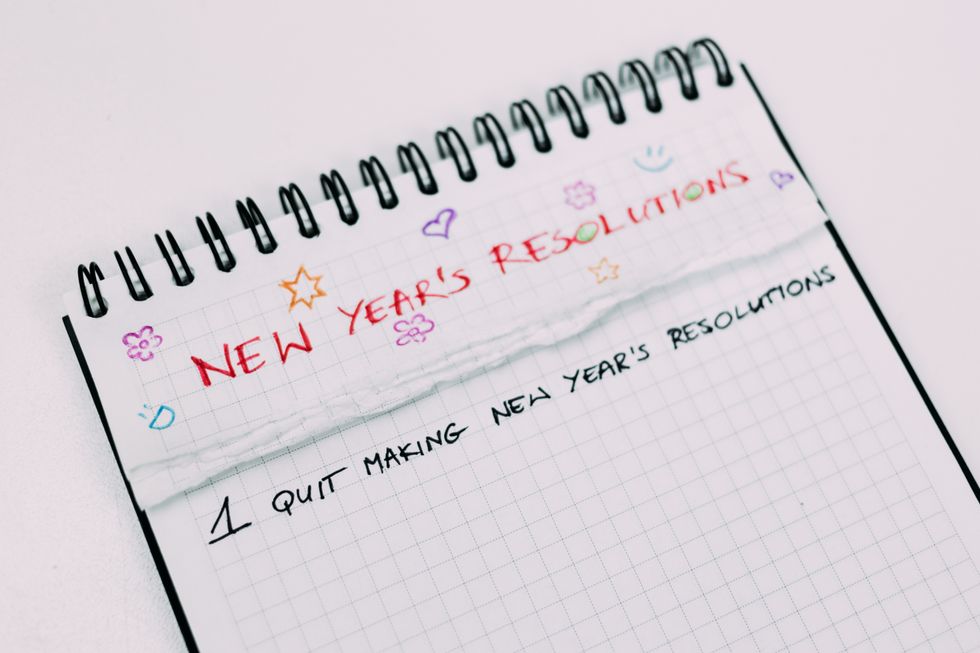Christmas is over, and now people everywhere are getting ready to say goodbye to 2017. Whether it was the most amazing year or the absolute worst, 2017 is almost gone, and 2018 is about to begin.
That means lists like this will be seen everywhere:
Lose weight.
Stop smoking.
Eat less junk food.
What do all of these things have in common? They are all the most common New Year's resolutions.
What else do all of these things have in common? They usually are never achieved.
The phrase "new year, new me" is said over and over. Most of us want to send our previous selves away along with the previous year. New Year's resolutions become all the rage.
But, do you want the truth?
New Year's resolutions are useless and, in some cases, have been proven to be bad for your health. Now, I am not saying setting goals to improve yourself is a bad thing. In fact, any way we can take our flaws and try to fix them and better ourselves is always going to be a good thing.
I am not saying all resolutions are bad. I am saying that there are specific ways in which we make resolutions that do more harm to us than they do good.
People say things like, "in this new year I am going to lose all my fat, get to a gym five times a week, completely change my look and become a new, better person."
The problem with resolutions like these is we make such big promises and think that is enough to motivate us. The truth is we rarely ever see these through.
Statistics say that only eight percent of people who make resolutions actually stick to them.
Steve Salerno, author of "Sham: How the Self-Help Movement Made America Helpless", says,
"Do we all not know people who make the same resolutions year after year? Or maybe we are that person. My concern is that the resolution takes the place of the action, as is also true with so many millions of people who sign up for an endless succession of self-help programs: They think some magic words, some avowed promise, will magically transform their lives, when we all know that the real transformational work is tough, grueling, and usually involves sacrifice and unpleasant choices."
Basically, people want to see change without putting in any work. They want the action of saying, "this new year I will do this" or, "this new year I will stop doing this" to be all the work they have to do in order to see change.
Not actually doing work to see change can actually make the thing you are trying to change worse.
For example, if you have an issue with smoking, you say, "this new year, I will stop smoking cigarettes." You say you will stop, but you don't actually have a plan on how you are going to stop.
You just want the action of saying, "I will stop" to be enough.
When you inevitably fail, and you will if you have no course of action, then you begin to feel defeated and feel like a failure. If you use smoking as a way to relieve stress, you will begin smoking more because you are stressed that you haven't been able to stop.
Ann Cuddy, a social psychologist, says we are bad at making reasonable goals. We either go with absolutes like "I will get to the gym five times a week" or very vague goals like "I will get a job."
Goals like these make them very hard to stick with.
She also says we don't take time to allow for failure. We are so set on our outcomes and not setting a process. Of course, we are going to fail--failure is a part of any process.
We fail and then we know what works and what we need to fix. Creating a process to get to your ultimate goal is the only way to get to your goal.
Jen A. Miller, a writer for "Smarter Living," says we should get SMART with our New Year's resolutions.
Specific: Set concrete, clearly defined goals with specific points of success.
Measurable: Whatever the goal, find ways to measure your progress.
Achievable: Aim high, but within reach. The goal should make you struggle but, ultimately, you should be able to obtain it.
Relevant: Find something that is really important to you that you want to change. The more it matters, the more motivated you will be to change it.
Time-bound: Set a reasonable timeline for your goal and celebrate the small victories along the way.
So maybe I don't think all resolutions are useless and terrible. We should all want to be better. I just think we definitely need to change the way we go about our resolutions.



















